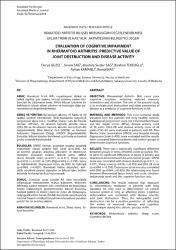ROMATOİD ARTRİTTE BİLİŞSEL BOZUKLUĞUN DEĞERLENDİRİLMESİ: EKLEM YIKIMI VE HASTALIK AKTİVİTESİNİN BELİRLEYİCİ DEĞERİ

View/
Access
info:eu-repo/semantics/openAccessDate
2018Author
Güzel Erdoğan, DeryaSağ, Sinem
Sağ, Mustafa Serdar
Tekeoğlu, İbrahim
Kamanlı, Ayhan
Nas, Kemal
Metadata
Show full item recordAbstract
AMAÇ: Romatoid Artrit (RA), oryantasyon, dikkat ve bellek zayıflığı gibi azalmış bilişsel işlevlere neden olur. Sunulan bu çalışmanın amacı RA’da bilişsel işlevlerin bir belirleyicisi olarak eklem yıkımını ve hastalığın diğer parametrelerini değerlendirmektir. GEREÇ VE YÖNTEM: Bu kesitsel çalışma, 45 hasta ve 40 sağlıklı kontrol içemektedir. RA’lı hastalarda radyolojik progresyon skoru (?0.5, modifiye Sharp / van der Heijde skorları- MTS’ler), 28 eklemin hastalık aktivite skoru (DAS-28) ve 44 eklemin hastalık aktivite skoru (DAS-44) değerlendirildi. Mini Mental Test (MMSE) ve Hastane Anksiyete Depresyon Ölçeği (HADÖ) değerlendirildi. Sonuçlar, bilişsel işlevleri belirlemek için hasta ve kontrol grubu arasında karşılaştırıldı. BULGULAR: MMSE skorları açısından gruplar arasında istatistiksel olarak anlamlı fark vardı (p=0.003). RA ve kontrol grupları arasında anksiyete ve depresyon düzeyleri açısından anlamlı farklılık yoktu. MMSE skoru; hastalık süresi (p=0.011, r=-0.371), Sharp skoru (p=0.018, r=-0.350) ve DAS-28(p=0.044, r=-0.296) skoru ile ilişkilendirildi. Depresyon skoru da DAS ile ilişkiliydi (p=0.004, r=0.425). Romatoid faktör düzeyleri, antisiklik sitrullinat peptid düzeyleri ve bilişsel işlev testleri arasında herhangi bir ilişki bulunamadı. SONUÇ: Sonuçlar, uzun süredir RA olan hastalarda inflamatuar mediatörlere maruz kalmanın, eklemleri etkilediği sürece merkezi sinir sisteminde de bozulmaya neden olabileceğini göstermektedir. Bilişsel bozulma, hastalık şiddeti ve eklem yıkımı ile ilişkili idi. Dolayısıyla, radyografik eklem hasarı, RA’daki bu kronik süreç boyunca nöronal hasarın ve bilişsel bozulmanın boyutunu yansıtan pozitif bir ön belirteç olabilir. OBJECTIVE: Rheumatoid Arthritis (RA) cause poor cognitive functions including reduced memory, orientation and attention. The aim of the present study is to evaluate joint destruction and other parameters of disease as a predictor of cognitive functions in RA. MATERIAL AND METHODS: This cross-sectional study included forty five patients and forty healthy controls. Radiological progression score (?0.5 the modified Sharp/ van der Heijde scores- MTSs), disease activity score of 28 joints (DAS-28) and disease activity score of 44 joints (DAS-44) were evaluated in patients with RA. Mini Mental State Examination (MMSE) and Hospital Anxiety Depression Scale (HADS) were evaluated and the results were compared between patients and control groups to determinate cognitive functions. RESULTS: There was a statistically significant difference between groups in terms of MMSE scores (p=0.003). There were no significant differences in terms of anxiety and depression levels between RA and control groups. MMSE score was correlated with disease duration (p=0.011, r=- 0.371), Sharp score (p=0.018, r=-0.350) and DAS-28 score (p=0.044, r=-0.296). Depression score was also correlated with DAS (p=0.004, r=0.425). No relationship was found between Rheumatoid factor levels, anti-cyclic citrullinated peptide levels and the cognitive function tests. CONCLUSIONS: The results indicate that exposure to inflammatory mediators in patients with long standing RA may lead to deterioration on central nervous system as long as affecting joints. Cognitive deterioration was correlated with disease severity and joint destruction. Thus, the radiographic joint destruction can be a positive predictor of reflecting the extent of neuronal damage and cognitive deterioration during this chronic process in RA.















